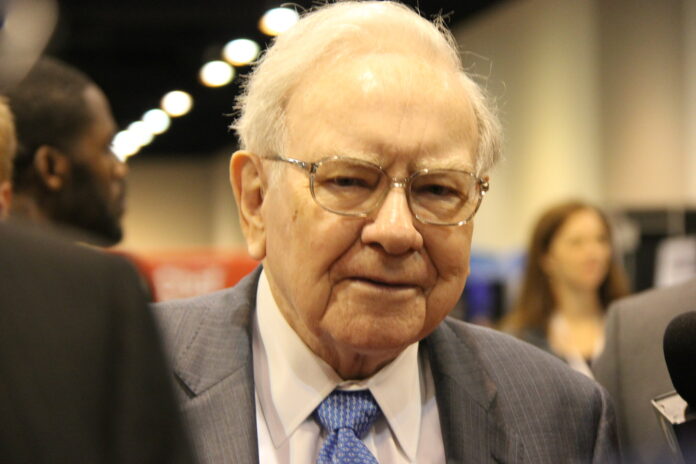The Oracle of Omaha is on a selling spree, and this financial stock is on the chopping block.
Warren Buffett hasn’t seen a lot to like in the stock market in quite some time. In each of the last seven quarters, Buffett sold more stock from Berkshire Hathaway‘s (BRK.A -0.99%) (BRK.B -1.18%) equity portfolio than new purchases. And it looks like he’s about to make it a full two years.
Last quarter, Buffett cut his company’s massive position in Apple nearly in half. It was, by far, the biggest stock sale in the history of Berkshire Hathaway, amounting to roughly $72.6 billion. This quarter, Buffett has turned his attention to Berkshire’s second-largest holding. At least, it used to be.
While we normally have to wait until Berkshire’s quarterly filings with the SEC to see what moves the Oracle of Omaha and his team are making in the company’s portfolio, there are some special exceptions. When an investor owns more than 10% of a publicly traded company, it must publicly report every stock purchase or sale within three days. That’s why we know Buffett’s been selling Berkshire’s stake in Bank of America (BAC -2.81%).
After selling $3.8 billion worth of the stock between July 17 and Aug. 1, Buffett sold another $3.1 billion in late August and early September. The value of Berkshire’s holding has gone from $41.1 billion at the end of the second quarter to about $34 billion today.
Here’s why Buffett may be selling Bank of America stock.

Image source: The Motley Fool.
Making a bank withdrawal
At last year’s Berkshire Hathaway shareholder meeting, Buffett expressed his concerns about the banking industry. This was right after the Silicon Valley Bank collapse, and Buffett expressed the idea that banking has changed substantially over the decades and will continue to change. The Silicon Valley bank run demonstrates that in the digital age, a bank run can happen in a matter of seconds. “If people think that deposits are sticky anymore, they’re just living in a different era,” he said.
Later, Buffett explained it’s impossible to predict how the banking industry will change due to competing incentives from politicians, big bankers, consumers, and practically any other economic actor. But he said he does like one bank — Bank of America. “I like the management,” he said.
He added a note about Berkshire’s stock holding as well. “I proposed the deal with them, so I stick with it.”
It’s one thing to stick with a stock because you like the business and the management. It’s another to stick with it out of loyalty to a decision made over a decade ago. Perhaps Buffett recognized that fallacy earlier this year as he turned his focus to taking gains on some of his biggest investments.
As mentioned, Buffett sold a huge amount of Apple stock earlier this year. His reasoning, as he explained at this year’s shareholder meeting, was his expectation that corporate tax rates will increase in the near future. It’s better to take the gains now and pay the tax bill.
Of course, that only makes sense if the stock is trading for what Buffett asserts is its intrinsic value (or greater). So, he wouldn’t liquidate everything Berkshire holds. He may have sold Bank of America stock this quarter as its valuation has climbed, and he holds a significant gain on the stock. He bought a good portion of Berkshire’s Bank of America holdings for just $7.14 per share. The average sales price so far this quarter has been $41.25. On 150 million shares, that’s over $5 billion in realized gains.
Should investors sell with Buffett?
Bank of America stock has performed well this year amid expectations that the Federal Reserve will start cutting rates. It looks like those rate cuts are finally coming to fruition, with the Fed expected to announce its first rate cut since 2020 later this month.
The bank suffered amid rising interest rates due to holding bonds on its balance sheet with longer-than-average durations. As such, the value of those bonds declined as the Fed raised rates. Meanwhile, Bank of America was stuck holding low-interest bonds while the market forced it to pay higher short-term interest rates. As a result, net interest income declined considerably.
But management believes it’s hit a trough on net interest income, and the metric should start turning around next year. Bank of America should see an outsized benefit from declining interest rates as it still holds many long-duration bonds.
Furthermore, Buffett’s concern about how “sticky” deposits are with the bank is less of a factor for Bank of America, considering its one of the biggest banks in the country, making it a Global Systemically Important Bank, G-SIB. That status gives depositors much more confidence in the bank and the systems protecting it.
The stock currently trades around its five-year average price to tangible book value, indicating it’s probably fairly valued. Thus, it makes sense for Buffett to take advantage of the currently low tax rate, but investors interested in bank stocks may have a good opportunity to buy a great bank well positioned for declining interest rates.
Bank of America is an advertising partner of The Ascent, a Motley Fool company. Adam Levy has positions in Apple. The Motley Fool has positions in and recommends Apple, Bank of America, and Berkshire Hathaway. The Motley Fool has a disclosure policy.



